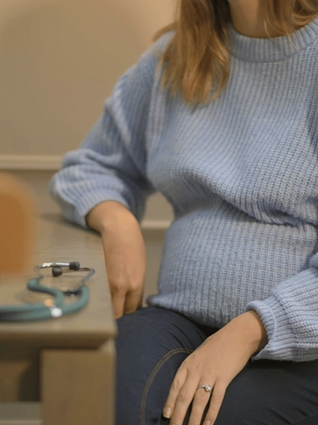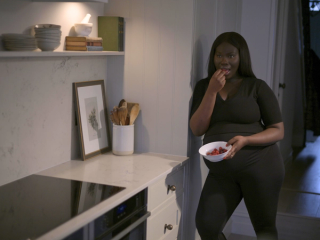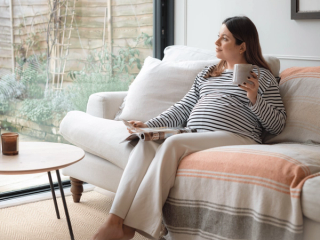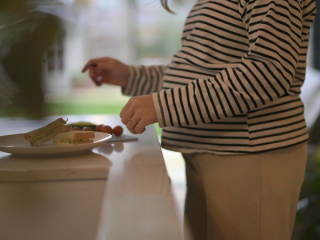
- Home
- Advice Hub
- Pregnancy
- Pregnancy Diet
- Food Allergies & Pregnancy
Food allergies & pregnancy
Learn about managing food allergies during pregnancy, key dietary tips, and safe choices for you and your baby with our expert insights.
Can you develop food allergies while pregnant?
It’s possible that any adult at any time can develop an allergy to something that they weren’t allergic to before.
During pregnancy, at a time where there are lots of changes to your hormone levels, it’s not uncommon for existing allergy symptoms and reactions that you had prior to pregnancy to change. It’s also possible to develop food allergies during pregnancy.
If you should notice any worsening of your allergy symptoms while pregnant, or think you’ve developed an allergy to something new, it’s important to seek advice from your healthcare professional.
Continue eating a healthy balanced diet, and don’t cut out any foods unless you are advised to do so, as you could end up restricting your nutrient intake.
What is an allergy?
An allergy is a reaction by the body to a food/substance that is usually harmless to most people (unless you are allergic to it!).
More specifically, it’s an immune system response where an allergic individual’s immune system identifies the food/substance as a ‘threat’ and produces an inappropriate response. Most allergic reactions are mild. However, in more severe cases it can cause anaphylaxis, a condition which can lead to upper respiratory obstruction and collapse and can be fatal.
Food Allergy vs Food Intolerance
Whilst a food allergy involves the immune system, where the immune system mistakenly recognises a food as harmful, and an allergic response and symptoms are seen. A food intolerance typically involves the digestive system and doesn’t trigger an immune response.
Food intolerances are caused by a substance within the food itself or by the body when there are problems digesting that food (such as lactose intolerance, which is caused by a lack of the lactase enzyme whose job it is to break down the lactose in foods).
Food intolerances can take some time to diagnose, and although not life threatening, they can cause unpleasant symptoms each time the food is eaten, which can last from a few hours sometimes to days. With a food intolerance the person may be able to tolerate a small amount of the food before they experience any symptoms.
Typical symptoms of a food intolerance:
- Abdominal pain, diarrhoea, bloating, stomach cramps, or constipation
- Flushing of the skin, urticaria (raised red, itchy rash), eczema flares or angioedema (which is similar to hives).
- Respiratory symptoms, such as breathing difficulties or wheezing
What is the likelihood of my child developing a food allergy?
Allergies are relatively common. They’re thought to affect more than 1 in 4 people at some point in their lives.
Most food allergies affect children under the age of 3, and many of those will grow out of the allergy by the time they start school.
In children, some of the foods that commonly cause allergic reactions include milk, eggs, peanuts, tree nuts, fish and shellfish. Peanut and tree nut allergies usually last longer, post school age, and some children will continue to have lifelong allergens.
Should I avoid any foods during pregnancy in case my child develops an allergy?
Mums-to-be, rest easy: there's no evidence that anything you do whilst pregnant will ‘cause’ your child to develop an allergy. There is also no evidence that the foods you eat (or don’t eat) when pregnant will cause (or prevent) your baby from developing an allergy in later life.
The Government used to advise pregnant women with a family history of allergies to avoid eating peanuts, as they thought this might increase the risk of a peanut allergy in the baby. However, it has since been discovered that there is no indication that consuming or avoiding nuts while pregnant will affect the likelihood of a child having an allergy. Therefore, unless you have been advised to do so, or you have an allergy to peanuts, you don’t need to avoid them.
The best thing you can do throughout pregnancy is to continue eating a healthy balanced diet, whilst avoiding and limiting those foods that are recommended for safety purposes. You can view more information on which food and drinks to avoid and limit during pregnancy HERE.
What if I have a food allergy whilst pregnant?
Carry on eating a healthy balanced diet, restricting the foods that you are allergic to, and continue taking any prescription medication that your GP or other healthcare professional has advised is safe throughout pregnancy.
If you have multiple allergies that restrict your diet considerably, you may be referred to a dietitian to help design a balanced pregnancy eating plan that will give your baby all the necessary nutrients.
Do I need to avoid any foods after birth?
The NHS recommends breastfeeding your baby for at least the first six months. This is because breast milk contains all the nutrients your baby needs, along with antibodies from your immune system, to help them develop a healthy immune system. While breastfeeding, you don’t need to avoid any allergens (unless you have an allergy!). You can also read our guide on what foods to eat or avoid whilst breastfeeding for a better indication. If you suspect that your baby has a sensitivity or allergy to something you are eating, seek advice from a medical professional. Don’t cut things out of your diet without consulting with your GP or other healthcare professional.
Likewise, if you are formula feeding and suspect your baby may be showing signs of a milk allergy, talk to your healthcare professional. Don’t switch over to a hypoallergenic formula milk without first seeking medical advice.
In all allergy cases, early diagnosis and treatment makes managing the symptoms easier. So if you think your child has an allergy you should see your doctor for advice.





